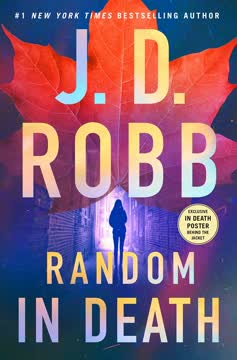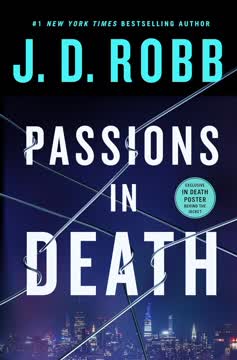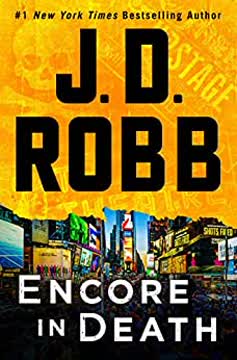Plot Summary
Roots Without Rest
Raised as an army brat, Morgan's childhood is a blur of constant moves, never putting down roots. As an adult, she's determined to build a life of her own: she buys a fixer-upper outside Baltimore, works two jobs, and shares her home with her vivacious roommate, Nina. Morgan's dreams are simple—own her own bar, create a home, and finally belong somewhere. Her life is full of hard work, small joys, and the comfort of chosen family. But beneath the surface, her sense of security is fragile, and she's haunted by the fear that happiness is always temporary.
The Perfect Mark
Into Morgan's carefully constructed life walks Luke Hudson, a handsome, attentive IT consultant. He's everything she's been too busy to look for: funny, interested, and seemingly genuine. Their flirtation grows into a tentative romance, and Morgan lets herself hope for more. But Luke is not who he seems. He's Gavin Rozwell, a chameleon-like con artist and serial killer who targets women like Morgan—single, self-sufficient, with androgynous names and a desire for connection. He studies her, infiltrates her life, and waits for the perfect moment to strike.
A Life Stolen
While Morgan is at work, Rozwell breaks into her home. Nina, home sick, surprises him. He kills her brutally, then ransacks the house, stealing Morgan's identity, her savings, and her car. Morgan returns to a crime scene, her best friend dead, her life in ruins. The police investigation reveals the depth of the violation: Rozwell has emptied her accounts, maxed out her credit, and left her with crushing debt. The trauma is compounded by guilt and the realization that the man she trusted was a predator. Morgan is left with nothing but grief and fear.
Aftermath and Ashes
With her finances destroyed and her home tainted by violence, Morgan loses everything she worked for. She's forced to sell her house at a loss, declare bankruptcy, and move in with her mother and grandmother in Vermont. The transition is wrenching—she feels like a failure, haunted by loss and the knowledge that Rozwell is still out there. But her family's love and the quiet beauty of Vermont offer a fragile hope. Morgan begins to rebuild, taking a job as a bar manager at a local resort, determined to reclaim her life.
The Predator's Pattern
Rozwell, on the run, targets new victims, but none satisfy him the way Morgan did. She is the one who got away, the only mark to survive. His obsession grows, and he leaves taunting clues—stolen jewelry, identity theft, and messages meant to terrify her. The FBI, led by agents Beck and Morrison, track his movements, but he always seems a step ahead. Morgan, meanwhile, refuses to be paralyzed by fear. She takes self-defense classes, strengthens her body and mind, and leans on her new community.
Rebuilding on Ruins
In Vermont, Morgan's resilience is tested, but she discovers new purpose. She bonds with her mother and grandmother, learning the value of roots and shared history. At the resort, she excels as a manager, earning the respect of her colleagues and the interest of Miles Jameson, the resort's owner. Their relationship grows from mutual respect to deep love, offering Morgan a second chance at happiness. She learns to accept help, to trust again, and to believe she deserves joy.
The Hunter's Shadow
As Rozwell's life unravels—living in squalor, hunted by law enforcement—his obsession with Morgan intensifies. He blames her for his failures, convinced that killing her will restore his luck. He stalks her online, hacks her accounts, and sends threatening messages and unwanted deliveries. The FBI closes in, but Rozwell is cunning, changing identities and leaving a trail of violence. Morgan's fear is real, but she refuses to let him dictate her life. She prepares, determined to face him if he comes.
New Beginnings, Old Fears
As Morgan and Miles fall in love, they blend their families and communities, planning a future together. Wedding plans, work successes, and the support of friends and family bring light into Morgan's life. But Rozwell's shadow remains—he is still at large, and the threat he poses is ever-present. Security is tightened, and Morgan's loved ones rally around her. She refuses to let fear win, choosing to live fully despite the risk.
The Circle Narrows
Rozwell, now a fugitive, grows increasingly erratic and violent. He kills again, hiding out in remote locations, but the FBI's net tightens. He is forced to live in squalor, his confidence shattered by Morgan's survival and resistance. Meanwhile, Morgan's life flourishes—she is promoted, her family thrives, and her relationship with Miles deepens. The contrast between predator and survivor becomes stark: Rozwell is isolated and desperate, while Morgan is surrounded by love and purpose.
The Trap Springs
Unable to resist the compulsion to finish what he started, Rozwell returns to Vermont. He breaks into Morgan's home, taking her mother and grandmother hostage. Morgan, coming home late from work, is confronted by her worst nightmare. But she is not the same woman he once targeted. Using her self-defense training and quick thinking, she fights back, buying time and signaling for help. Miles, the police, and the FBI arrive in time to subdue Rozwell. Morgan's courage and preparation save her family and herself.
The Final Reckoning
Rozwell is arrested, his reign of terror ended. The FBI and local police ensure he will never harm anyone again. Morgan, though shaken, is triumphant—she has faced her greatest fear and survived. The community that supported her celebrates her strength. She and Miles move forward with their wedding plans, surrounded by family and friends. The trauma lingers, but Morgan is no longer defined by what was done to her. She is a survivor, not a victim.
Love, Loss, and Legacy
In a joyful spring ceremony, Morgan and Miles wed in the garden of their Vermont home, surrounded by loved ones. The memory of Nina and all that was lost is honored, but the focus is on hope and new beginnings. Morgan's journey from rootless wanderer to deeply rooted wife, daughter, and friend is complete. She has built a life of meaning, love, and resilience.
Healing in the Sun
With Rozwell gone, Morgan is free to live without fear. She and Miles build a home filled with laughter, family, and community. The lessons of loss and survival shape her, but do not define her. She tends her garden, nurtures her relationships, and looks to the future with confidence. The story ends not with vengeance, but with healing, love, and the promise of a life well-lived.
Characters
Morgan Albright
Morgan is the heart of the story—a woman shaped by a rootless childhood and determined to build a life of her own. Her journey is one of trauma, loss, and ultimately, transformation. After being targeted by a serial killer who steals her identity and murders her best friend, Morgan is forced to start over from nothing. Her psychological arc is defined by resilience: she refuses to be a victim, instead channeling her pain into growth. Through family, work, and love, she reclaims her sense of self, learning to accept help and trust again. Her development is a testament to the power of community, self-reliance, and hope.
Gavin Rozwell (Luke Hudson)
Rozwell is a master manipulator, able to become whatever his victims need. His pathology is rooted in narcissism, misogyny, and a need for control. He targets women who are independent but vulnerable, using charm to gain their trust before destroying their lives. Rozwell's psychological unraveling is central to the plot: Morgan's survival shatters his confidence, and his obsession with her becomes his undoing. He is both a symbol of random, predatory violence and a study in the emptiness of evil—isolated, desperate, and ultimately defeated by the strength of his intended victim.
Nina Ramos
Nina is Morgan's roommate and chosen family, representing the warmth and joy of found community. Her murder is the catalyst for Morgan's transformation, and her memory haunts the narrative. Nina's presence is felt throughout the story as a reminder of what was lost and what is at stake. Her death is senseless, but her influence endures in Morgan's determination to survive and honor her.
Miles Jameson
Miles is the owner of the Vermont resort where Morgan rebuilds her life. He is calm, grounded, and deeply loyal—a man who values family, tradition, and quiet strength. His relationship with Morgan is built on mutual respect, shared values, and a willingness to face hardship together. Miles's support is crucial to Morgan's healing, but he is never a savior—he stands beside her, not in front of her. His own development is subtle: he learns to open his heart, accept vulnerability, and embrace the unpredictability of love.
Olivia Nash
Morgan's grandmother, Olivia, is a force of nature—practical, wise, and unflinching. She provides the stability and perspective Morgan needs, teaching her the value of roots, resilience, and self-worth. Olivia's relationship with Morgan is both nurturing and challenging, pushing her to grow while offering unconditional support. She represents the strength of generational wisdom and the importance of chosen family.
Audrey Nash
Morgan's mother, Audrey, is softer than Olivia but no less strong. Her journey is one of reclaiming her own identity after years of self-doubt and failed relationships. Audrey's bond with Morgan deepens as they heal together, learning to accept love and let go of the past. She is a model of quiet endurance and the transformative power of forgiveness.
FBI Agents Beck and Morrison
Beck and Morrison are the federal agents tracking Rozwell. Their partnership is marked by mutual respect, competence, and a deep sense of responsibility. They provide both practical support and emotional validation for Morgan, representing the best of law enforcement—persistent, empathetic, and unwilling to give up. Their own fatigue and frustration humanize them, and their belief in Morgan's strength is a crucial counterpoint to Rozwell's predation.
Opal Reece
Opal is the head waitress at Après, initially resentful of Morgan's hiring and suspicious of her motives. Her arc is one of grudging respect: as she witnesses Morgan's competence and courage, she becomes a supporter. Opal's skepticism and eventual acceptance mirror the broader theme of earning trust and building community.
Jen
Jen is Morgan's self-defense instructor and a symbol of empowerment. She pushes Morgan to become physically and mentally strong, providing both practical skills and emotional encouragement. Jen's presence underscores the importance of agency and preparation in the face of danger.
Liam and Nell Jameson
Miles's siblings, Liam and Nell, represent the warmth and complexity of extended family. Nell, in particular, becomes a close friend and confidante to Morgan, helping her navigate both work and personal challenges. Their acceptance of Morgan is a key part of her integration into the community and her sense of belonging.
Plot Devices
Identity Theft as Existential Threat
Rozwell's crimes are not just financial—they are violations of self, security, and trust. The plot uses identity theft as a metaphor for trauma: Morgan's sense of self is shattered, and she must rebuild from the ground up. The device allows for exploration of vulnerability, resilience, and the ways in which community and love can restore what was lost.
Dual Narrative: Predator and Prey
The story shifts between Morgan's journey and Rozwell's predatory path, creating a cat-and-mouse dynamic. This structure allows readers to see both the terror of being hunted and the emptiness of the hunter. Foreshadowing and parallelism are used to build tension, as Rozwell's unraveling mirrors Morgan's strengthening.
Found Family and Community
The narrative emphasizes the importance of chosen family, community support, and intergenerational wisdom. Morgan's recovery is not solitary—she is lifted by her mother, grandmother, friends, and colleagues. The plot uses family rituals, shared meals, and collaborative problem-solving as devices to show the power of belonging.
Empowerment Through Preparation
Morgan's transformation from victim to survivor is marked by her decision to prepare—physically, emotionally, and practically. The story uses training montages, security upgrades, and strategic planning as devices to show that empowerment is an active process. Foreshadowing is used as Morgan's preparation pays off in the final confrontation.
The Past as Prologue
The narrative structure echoes the idea that the past shapes the present, but does not have to define the future. Morgan's journey is one of breaking cycles—of rootlessness, of victimhood, of fear. The story uses flashbacks, family history, and the motif of planting roots to show that healing is possible, but requires courage and community.
Analysis
Nora Roberts uses the framework of a romantic suspense novel to explore deep psychological themes: the violation of self, the long shadow of violence, and the slow, hard work of healing. The book is as much about reclaiming one's life as it is about catching a killer. Morgan's journey from devastation to wholeness is a testament to the strength found in family, friendship, and self-determination. The novel argues that evil can shatter lives, but it cannot destroy the human capacity for hope, love, and renewal. In a world where identity can be stolen in an instant, what endures are the roots we plant, the people we trust, and the courage to begin again.
Last updated:
Review Summary
Identity by Nora Roberts is a romantic suspense novel that received mixed reviews. Many readers praised the well-developed characters, engaging plot, and balanced blend of romance and suspense. The story follows Morgan Albright, whose life is shattered by a con artist who steals her identity and murders her roommate. As Morgan rebuilds her life, she faces the looming threat of the killer's return. Some critics found the pacing slow and the writing repetitive, while others enjoyed the family dynamics and resort atmosphere. Overall, most reviewers found it an entertaining read despite some flaws.
Download PDF
Download EPUB
.epub digital book format is ideal for reading ebooks on phones, tablets, and e-readers.














